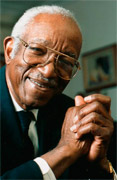 John Hope Franklin lived through most of the twentieth century. He was a gentle man, a scholar, an activist, and a truth-teller. He studied history and he helped to make it.
John Hope Franklin lived through most of the twentieth century. He was a gentle man, a scholar, an activist, and a truth-teller. He studied history and he helped to make it.
Professor Franklin died March 25. Born in 1915, during his 94 years, he experienced both the good and the bad of being an African American in the United States. One of his earliest memories was being put off a train because of segregation laws and customs. He was a child in tears in night woods -- with a mother who told him that, law and custom notwithstanding, he was still a valuable human being.
He graduated from a segregated high school with honors in 1931, but he could not attend the University of Oklahoma because he was black. He received his undergraduate degree from Fisk, a black school. When he decided to study for the Ph.D. at Harvard, Theodore Currier, a white history professor, friend, and mentor, loaned him $500.
He worked hard and built a stellar academic record, publishing several important books, the most important of which was From Slavery to Freedom: A History of African Americans, published in 1947. He was the first African-American department chair of a predominantly white institution, Brooklyn College. At the same time, in 1956, he visited 35 real estate agents before he found one to sell him a house. No bank in New York would loan him money. He was also the first African-American president of the American Historical Association and the first African-American to hold an endowed chair at Duke University. In 1995, President Clinton awarded him the Presidential Medal of Freedom, this nation's highest civilian honor.
Franklin was worthy of such honor because his was also an activist. He defended W.E.B. Du Bois during the communist phase of his friend's life, arguing that scholars ought to be free to say controversial things. His work helped Thurgood Marshall and the NAACP win the Brown v. Board of Education case, striking down the "separate but equal" segregation laws in public education. He marched with Martin Luther King Jr. from Selma to Montgomery. In 1997, he headed President Clinton's national advisory board on race. In 2007, he testified in Oklahoma congressional hearings in favor of legislation that would allow survivors of the Tulsa race riot of 1921 to sue for reparations.
Despite his national renown, in his eighties, there were still times when, while he was standing in a hotel, someone would hand him their car keys, expecting him to perform valet services. He was courtly but firm in his refusal.
Truth. Respect. Security. These are three categories of just-peace theory. Scholars reside in the category of truth, working to help us find, know, face and use it. Franklin said: "You can't have a high standard of scholarship without having a high standard of integrity, because the essence of scholarship is truth."
And the truth will set us free from fear and set us free to make peace.
 Dr. Valerie Elverton Dixon is an independent scholar who publishes lectures and essays at JustPeaceTheory.com. She received her Ph.D. in religion and society from Temple University and taught Christian ethics at United Theological Seminary and Andover Newton Theological School.
Dr. Valerie Elverton Dixon is an independent scholar who publishes lectures and essays at JustPeaceTheory.com. She received her Ph.D. in religion and society from Temple University and taught Christian ethics at United Theological Seminary and Andover Newton Theological School.
Got something to say about what you're reading? We value your feedback!